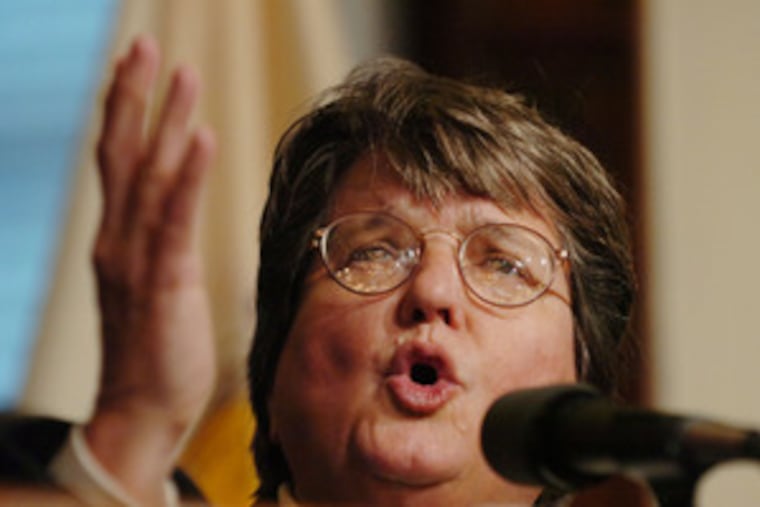N.J. first to abolish the death penalty
Cost of appeals, uncertainty over guilt were factors.

TRENTON - Gov. Corzine yesterday signed into law a measure to abolish the state's death penalty, putting New Jersey into the vanguard of the fight against capital punishment.
With Corzine's signature, New Jersey became the first state to remove the death penalty from the books since the U.S. Supreme Court reinstated it in 1976. Corzine said yesterday he saw a moral duty to end "state-endorsed killing."
The Democratic governor said the death penalty amounted to an "endorsement of violence," and as such it only "begets violence."
He also marshaled a series of pragmatic objections to capital punishment: that it did not deter; that it risked killing the unjustly accused; that there likely was no humane way to kill with lethal injection; and that it cost taxpayers millions in legal bills defending endless appeals from death-row inmates.
The new law immediately spared the lives of the eight men in New Jersey who had been awaiting death by lethal injection. They include the convicted killer of Megan Kanka, the 7-year-old whose rape and murder fueled a national movement to register sex offenders.
In a step Corzine said was designed to ensure that the men remained behind bars until their deaths, he disclosed that on Sunday night he signed orders commuting the sentences of those eight to life in prison without parole.
Assemblyman Wilfredo Carraballo, the Newark Democrat who was a prime sponsor of the abolition bill, said the cause gathered momentum with the support of some of the relatives of murder victims.
These survivors, he said, "had the grace to tell us we were doing them no favors by taking someone's life."
However, Assemblyman Alex DeCroce, who leads the Republicans in the Assembly, where they are in the minority, ripped into Corzine.
"I consider it abominable that the governor would repeal the death penalty for cold-blooded killers," DeCroce, of Morris County, said in a statement.
With most, but not all, of the yea votes coming from Corzine's fellow Democrats, who are in the majority in both chambers, the Legislature passed the abolition bill last week and sent it to Corzine, who has long been on record as a death-penalty opponent.
In 1972, the U.S. Supreme Court overturned every death sentence in the nation, saying the penalty was being unevenly applied. Four years later, it laid out new rules by which capital punishment could be implemented. After a long debate, New Jersey put capital punishment back into effect in 1982.
Even so, the state has not in fact applied the ultimate punishment since 1963. The last New Jerseyan put to death was Ralph Hudson, who stabbed his wife to death in the Atlantic City restaurant where she worked as a waitress. He died in the electric chair.
In other states where executions were recently halted, the decisions came after a local court ruling voided the death-penalty law, as in New York, or because a governor imposed a moratorium, as in Illinois.
Richard Kanka, Megan's father, noted yesterday that Corzine had signed the bill exactly 15 years to the day that death-row inmate Ambrose Harris kidnapped, raped and murdered Kristin Huggins, 22, a Bucks County artist.
"Just another slap in the face to the victims," Kanka said.
Some lawyers have expressed worry that, because law cannot be changed retroactively, the death-penalty repeal in New Jersey could prompt the eight on death row to contend that the new penalty of life without parole was only for future convicted killers and that they should be eligible for parole.
To block any chance of that, according to Corzine aides, lawyers in his administration drafted the commutation orders the governor signed Sunday, stipulating that all should die in prison.
Tom Rosenthal, a spokesman for the New Jersey Public Defender's Office, which represents the eight men, said the agency was exploring whether it was legal for Corzine to impose sentence without parole, as that wasn't an option in state law for all eight when they were sentenced.
Still, Rosenthal said his office had only begun to research the issue.
As a practical matter, even under the old law, most of those on death row would have to serve decades more before they could even apply for parole.
Of the eight, David Cooper, now 37, convicted of raping and strangling a 6-year-old, would be the youngest before he was eligible for parole - at age 78.
Corzine's signature yesterday climaxed a movement that began picking up real steam in New Jersey in January, when a special state commission voted, 13-1, to urge the state to abolish the death penalty.
Among other points, the commission found that capital punishment was increasingly viewed as "inconsistent with evolving standards of decency." It noted that the U.S. Supreme Court had recently banned executions for juveniles and the mentally retarded.
The commission also said the death penalty raised the possibility of an "irreversible mistake."
Kathleen Garcia, whose nephew was killed in 1984, said the failure to actually execute anyone left relatives without closure.
Garcia, who founded a center that counsels victims' relatives, voted in favor of abolition as a member of the state's review commission.
"It was a joke in New Jersey, a very cruel joke," she said. "It was time to end it."